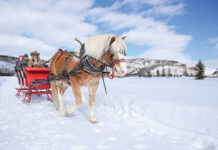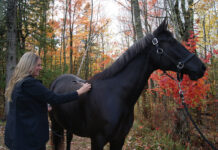 By now, you’ve surely heard about Courtney King-Dye’s accident in Florida. You can read the article here. Current reports are that she is gradually improving and her vital signs are good, but she is still in a coma.
By now, you’ve surely heard about Courtney King-Dye’s accident in Florida. You can read the article here. Current reports are that she is gradually improving and her vital signs are good, but she is still in a coma.
I’ve hashed out my feelings on helmet use on this blog before. I used to be a sometimes helmet-wearer, but now I’m a believer in, “every time, every ride.” There’s no reason not to wear one, in my opinion. Helmets are becoming the norm for show jumpers, due in no small part to regulations requiring them, but they are still not part of the culture of most other disciplines. The horse show world likes its traditions, and a helmet on an upper-level dressage rider (or a barrel racer, or a saddle seat rider) just seems out of place.
Now can we all agree that it’s time to move past this mentality?
Nothing, including helmets, can make riding 100% safe, but numerous studies have shown that helmets greatly reduce the risk of head injury and brain damage. This has been widely known for many years, and yet, those statistics do little to sway riders who have already decided that they don’t want or need a helmet. But maybe seeing one of America’s best riders land in a hospital bed with a fractured skull will have more of an impact than raw facts and numbers.
Based on reports given after the accident, Courtney wasn’t doing anything especially dangerous. She was schooling a client’s horse, not working at speed or jumping. She was in a controlled environment. The horse wasn’t misbehaving. He simply slipped, and she fell with him. It could happen to any of us.
After the accident, Courtney’s fellow dressage riders at the Palm Beach Dressage Derby wore green ribbons for brain injury awareness. Several reports from the scene say that many upper level riders donned helmets in the schooling arenas, and some even wore them during their tests. It’s a touching act of solidarity, but was it indicative of a new attitude, or simply a symbol of support that will slip away by the next show? And will this have any effect on saddle seat or western riders, or competitors at breed shows who still sport those outdated “for apparel only” hunt caps?
Time will tell on the helmet issue. For now, we’re all just hoping for the best possible outcome for Courtney and her friends and family as her recovery continues. Her husband, Jason Dye, is posting updates on her status on her official website, courtneykingdressage.com
Fans can send cards, photos or messages of support to:
Courtney Dye
2442 Muir Circle
Wellington, FL 33414
If you would like to contribute to Courtney’s medical assistance fund, checks can be sent to:
Courtney King-Dye
c/o Lendon Gray
25 Lake Ave.
Bedford, NY 10506
Back to The Near Side





I too always wear a helmet and think it’s the smart thing to do. But I think what Courtney’s accident reminds us all (whether you wear a helmet or not)is that no matter how great your skills or how distant a memory your last fall seems, today or tomorrow it could be any of us. We tend to get complacent, or cocky, adopting a ho-hum, another day, another ride kind of attitude and it can be easy to forget how quickly things slide beyond our control.
I am a Paramedic and also a barrel racer in my local circuit. I’ve seen numerous inuries that could have been avoided if the rider was wearing a helment. I am normally the only one wearing a helment when I race, but I would rather have a few jokes made about me than to deal with a brain injury. I’ve worked enough calls here in horse country to know that a helment sometimes is the only thing that keeps a rider from dying or suffering a bad head/brain injury.
(I agree one hundred percent with this article. About 6 months ago my horse were going over a gymnastic and part of the jump had moved a little the last time we went over it but no body noticed until it was to late. When we came in it wasn’t spaced correctly, my horse tripped and hit the jump with her knee, lost her balance and we fell down to the ground together. She jumped off and brushed herself off immediatly but I was knocked unconscious for a few minutes. If I hadn’t of had a helmet on I could of been hurt much worse.